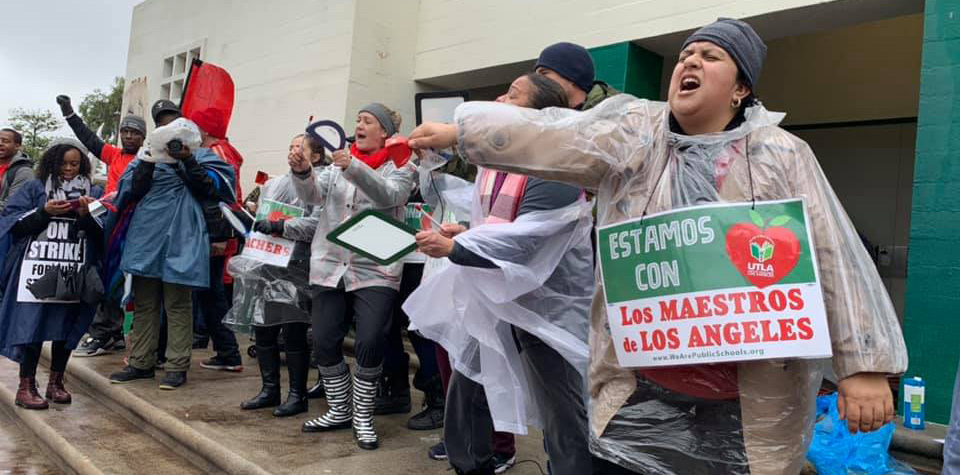It's Our World to Make

L.A. teachers went on strike in January, showing the labor movement how workers can win by withholding their labor. Photo: Chris Brooks.
The guy at the car rental counter found my T-shirt puzzling.
It was early on a Tuesday morning, and I had just flown back into L.A. Why, he wanted to know, was someone from Massachusetts wearing a shirt that said “United Teachers Los Angeles”?
I explained that I had been out the week before to support the teachers strike. I was back for a second round because this strike was important to educators across the country.
“The whole country? Why?”
His co-worker jumped in: “Because there are people looking to privatize public education through charters, and the union is working to save public education.”
“Really?” asked the first man. “But if they destroy public education, that would destroy democracy.”
“That’s why they need to win,” his co-worker said.
The L.A. teachers did win. But as I saw at the car rental counter, they’d already won before they reached a deal. UTLA changed how people all over the city saw charter schools, privatization, and teacher unions.
EXPOSED THE LIES
For two decades, Democrats, Republicans, and businesspeople of all stripes have deployed narratives of failing public schools and incompetent teachers defended by selfish unions.
In the lead-up to the strike, the L.A. superintendent ran through these familiar talking points. He claimed that teachers were overpaid, that schools were failing, and that competition between public and charter schools would fix everything.

SUPPORT LABOR NOTES
BECOME A MONTHLY DONOR
Give $10 a month or more and get our "Fight the Boss, Build the Union" T-shirt.
But UTLA exposed these lies and the corporate interests behind them. Instead of just a fight by teachers against an investment-banker-turned-superintendent, the union made it the community against corporate greed. The union revealed that charter promotion was being fueled by hedge fund managers and wealthy investors whose interests were profit, not the well-being of L.A. students.
In the years building up to the strike, educators, students, and parents organized together to resist as private charter schools robbed public school students of their learning and recreation spaces.
And when the district rejected their shared demands—to limit charter growth, shrink classes, and end random searches—teachers, parents, and students talked it over.
They talked about who was underfunding their schools, and who was trying to take over their schools, and why—and what they could do about it.
HOW WE LEARN
This kind of analysis—which exposes how private companies manipulate public money and connects workplace organizing to bigger political movements—is needed to win social change.
Lots of unions say we need political education. Too often they mean workshops on electoral politics, which teach at least three bad lessons: one, that our power is primarily in our vote; two, that the vote is about an individual; and three, that we should work within the system rather than dismantle it. All these limit how we understand power and what we imagine is possible.
But even when unions do educate members about economic and racial injustice, those lessons are incomplete unless they connect to a struggle where workers feel their own power.
I was a teacher. There’s a difference between what we learn from hearing about it, and from experience.
The difference is in what we come to know about ourselves. When we act collectively, we learn something new—that this is our world to make.
The teachers weren’t only teaching the people of L.A. about the corporate interests behind school privatization. They were also teaching workers how to win: by withholding labor. And that’s the kind of political education the labor movement needs most.





